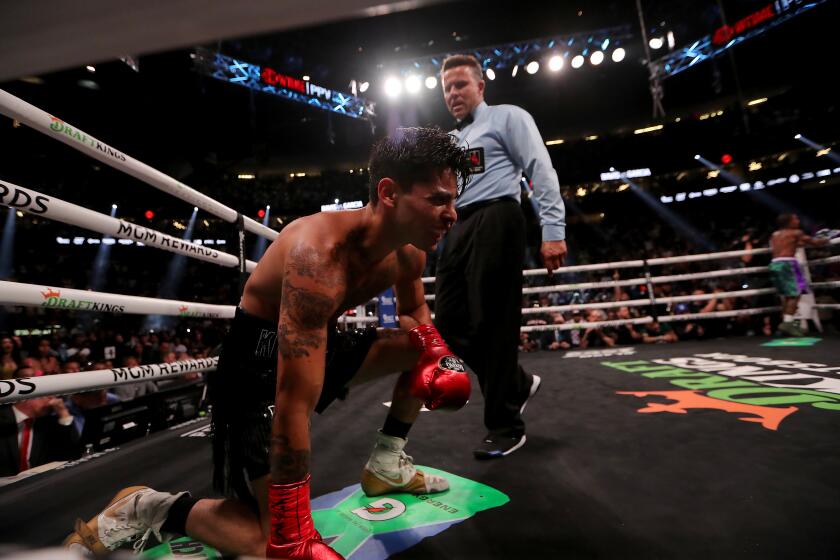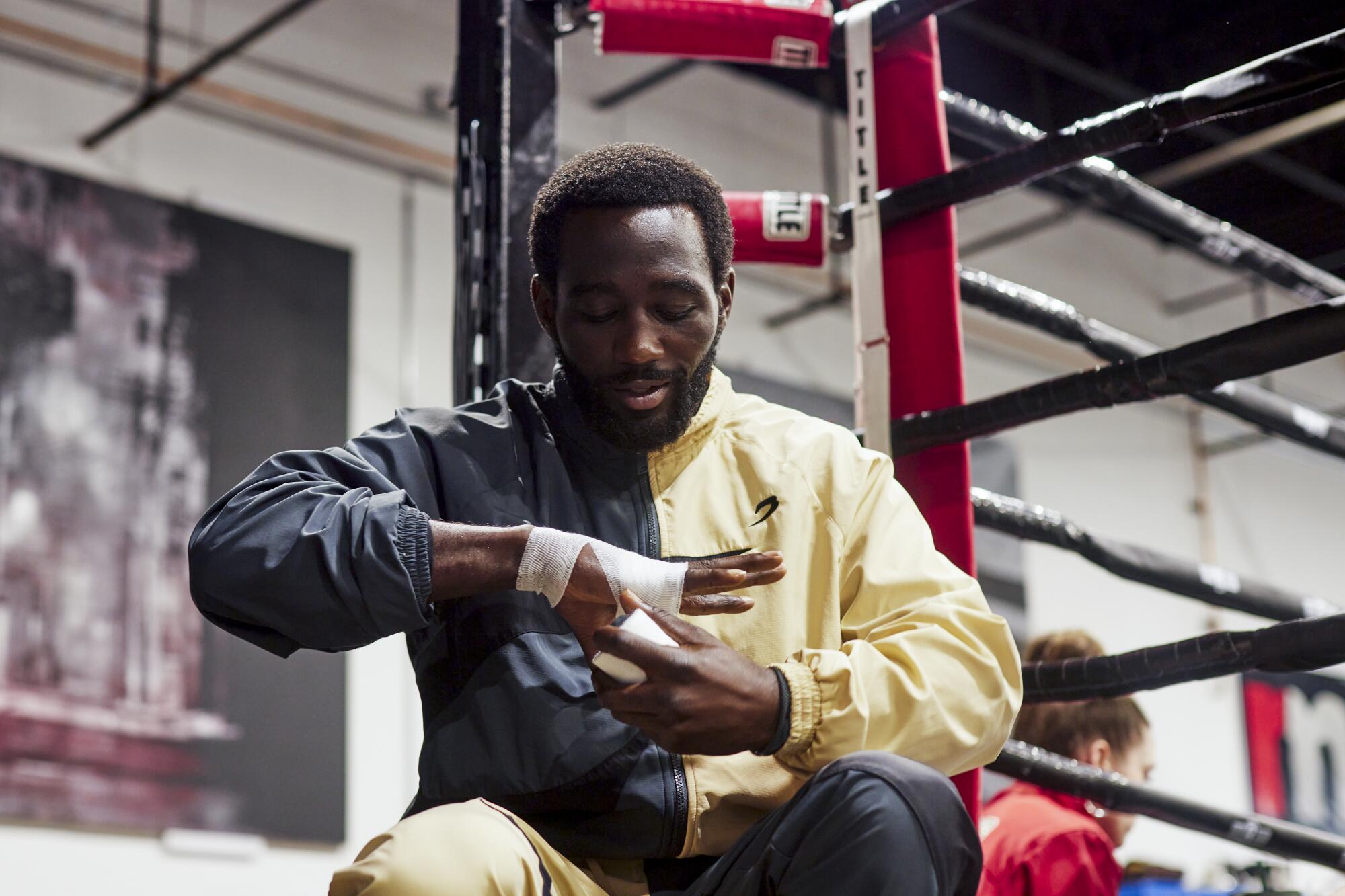
- Share via
COLORADO SPRINGS, Colo. — Deep in the eastern shoe of the Rockies, at the foot of Pikes Peak about 70 miles from Denver, the champion descended the stairs of his heartland-inspired camp house — ambling past fitted hats from decades ago, tiptoeing through exoskeletons of go-karts he’d been tinkering with and old Everlast gear hugging pounds of dog food. His eyes were barely open, yawns still sticking to the scruff of his swollen beard, but he knew there was work to do. Even if it required his father, “Big T,” to bang on the champ’s door — in scarlet and cream ‘Huskers pajamas no less — to get him going.
It’d been a few years since Bud and the boys got crackin’ from the base of the Cheyenne Mountain in this humble home. But it was something about the being in the elevation that soothed the champ whenever a fight drew near. Ever since his bronze in the nationals 16 years ago as an amateur: working in that crisp and colorful Colorado air, sweating in the gym and shadowboxing in the Garden of the Gods proved to be a key asset in making Terence “Bud” Crawford bulletproof.
Though, it wasn’t like Bud needed any convincing for this fight.
All he could do was smile — that playful, elegant gap-toothed grin of his — when he thought about what was at stake, what he fought for the last five years to attain; past broken promises from promoters and punches to his resume, no matter how many opponents he plowed through.
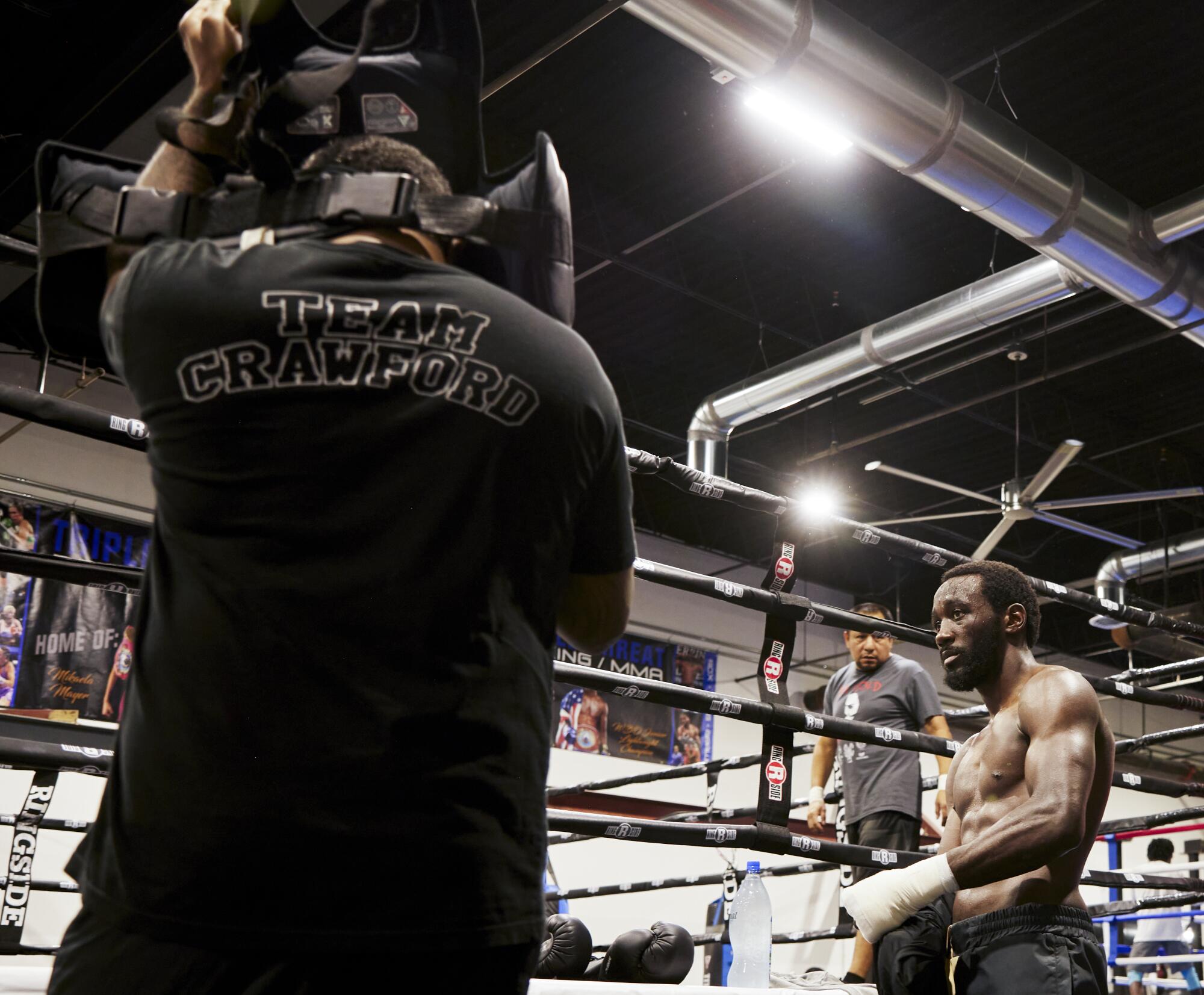
What he and every other fan of boxing around the world wanted to see was finally happening. He no longer had to lie to his kids about when there would be a date to something impossible; his trainers didn’t need to reign themselves in when folk asked when the dance was on. The pound-for-pound, undefeated, baddest man in the land believed he would walk out of Vegas on Saturday victorious, not just the king of the sport and first man ever to be an undisputed champ at two divisions in the four-belt era; but also a proud piscator after he guts the “Big Fish” Errol Spence Jr. in a title fight some of us merely dream of witnessing.
So, at dusk, we crept into the fog.
Bud hopped into a giant, blacked-out Chevy pickup and zoomed from his driveway with a cadre of his crew. In a more beaten-up Toyota: Esau “Tuto” Dieguez and Bernard “Bernie” Davis — two of Bud’s longtime confidants and trainers — jumped into the whip while Bud’s head man, Brian “BoMac” McIntyre, kept us close to the champ’s bumper.
BoMac planted his foot on the gas and swung us out of the compound, speeding through the lazy vapors around the boulders and playgrounds that mule deer graze at in the summer mornings. Bothered by how sleepy the neighborhood was that morning, Bud’s bucolic trainer cranked the stereo to the max, unstrapped his seat belt and bent the driver’s seat back so he could ride a bit dirtier. On came a street anthem from Jeezy and DJ Drama from their 2022 album SNOFALL, “I Ain’t Gon’ Hold Ya,” that felt fitting for Bud’s pursuit to the top; it kept the whip groovin’ all the way to the top of Gold Camp Road.
Around the end of one trailhead, Bud parked the pickup, quickly stretched and began to take on the six-mile trail at 7,000 feet elevation that creeped up the mountain, inch by soul-stealing inch. Bud proceeded at a trot while BoMac paced him from the car behind. Another coach drove the pickup in front of him as we crawled around Colorado, left and right, ripping up the road.
Ryan Garcia became obsessed with fighting Gervonta ‘Tank’ Davis. An inside look at why the promising young star signed on for an unwinnable bout.
BoMac refused to let Bud lower the pace for even a second. If he ever thought Bud needed a nudge, BoMac revved that engine, and flickered his headlights to get his fighter’s attention.
“Ayye,” Bud yelled. “Chill the f— out! You too close.”
BoMac, ever the delinquent, disagreed.
“Shut yo’ ass up before I run you over,” he replied, to laughs in the Toyota.
Bud tried to focus, to retain his iron-clad discipline as he kept pushing through the grueling climb. He needed to lock himself in a mausoleum of zen, to hush BoMac’s incessant crooning of “Love Controversy” by Loose Ends simultaneously blasting from the sedan’s radio and driver seat a few meters behind him. Quieting his mind was essential. Space and silence are necessary for the fighter, it was one of the only times on a lonely path toward the top where creativity can spark. But, it required them to go back to a dark place of desperation, to be gluttonous and greedy for the crown. No one came this far, as far as Bud Crawford climbed, only to fall back down the hill. He needed to reach for his destiny.
There, in an instant, I see a distinct shift in Bud’s gaze.
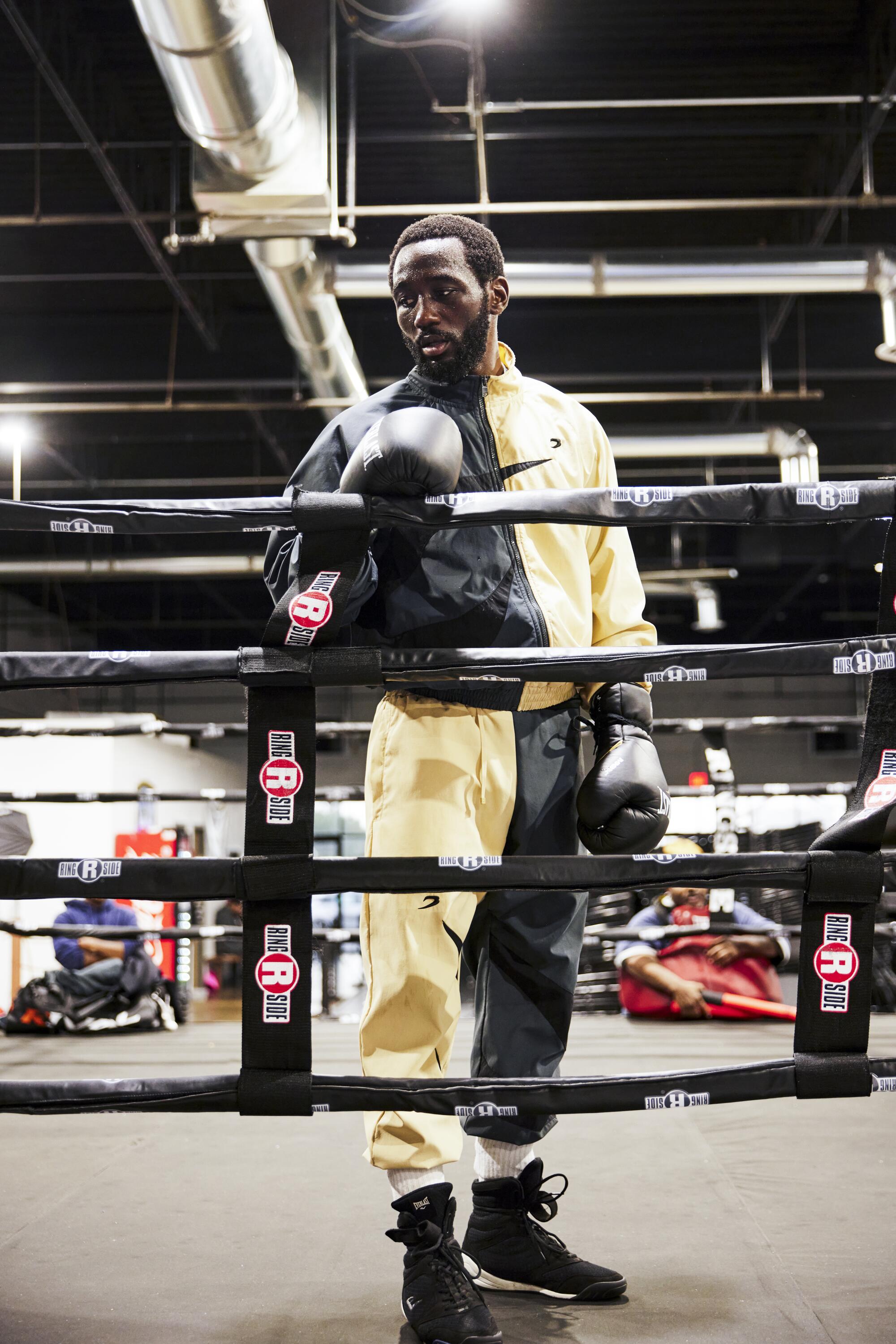
He lowered his head and started moving his mitts — left hand, then right; one combination flowing into the next while his dark silhouette switched stances and spiraled up the hill, cloaked only by a black hoodie, sweats and daybreak. His feet moved faster. Knees to chest. Over and over. Refusing to quit until he reached perfection, continuously honing his blade to its sharpest point. Near the peak, Bud was alone on the road. Just him versus the mountain — an old fighter swinging against whatever his mind could envision, entering a zone unfathomable to those of us who live outside of the ring.
BoMac and the boys warned me. This time of day, there were bears roaming around the mountain, big enough that this lil’ Toyota wouldn’t protect us from much. They’d been on high alert already, during the stay some bears snooped inside the garage and shook the outside refrigerator, spooking some of the folks in the camp house to the point coaches started carrying their pistols as they walked to the car at night, just in case the bears came back.
Around the bend, tires creeping over the dirt toward civilization, the coaches feverishly scurried because they thought they saw a pair of bears back on the road.
Worried something could happen to their fighter, they called the lead car to alert them of a potential threat. But Bud remained stoic. The crew in the pickup said he didn’t see the bears. He never broke pace. Bud just kept running. His eyes were unmoving, he was blinded by anything beyond his goal of being the best — of winning against anything his hands ever opposed.
It wasn’t obvious at that exact moment: but I suppose if I ever saw ol’ Bud Crawford in the woods, tusslin’ with a bear?
Well.
I’d muster up the strength to help the bear.
Folks ranging from Bud’s friends to family all say a variation of the same thing: he thrives in the throes of chaos. That means no isolated world keeping him from the community that has so staunchly backed him, especially not here in the region of the world he calls home. There could be no closed loop, nothing buried between him and the people who lifted him up and kept his spirit high in the dog days of camp.
Bud’s fury came into focus in a nearly abandoned strip mall off Airport Road in east Colorado Springs. Coach Lev made sure of it. Charles Leverette has been running Triple Threat Boxing, and the various versions of it, for years. It was a north star to the Springs, the boxing shrine for a scattered community in a town of champions.
Coach Lev was a breath of fresh Southern air, hardened by the Army and Bibb County, Ala. It was no wonder he used to lead USA Boxing after the London Olympics and coached its team for years. He ran the Army’s boxing cadet program out of Triple Threat after being inducted to the Colorado Golden Gloves Hall of Fame. Lev’s facility housed fighters from Mikaela Mayer to Jamel Herring through some of their most intense training, title fights and defenses.
Bud needed that environment in his days preparing for Errol. Mixing the youth of boxers from the Army in one corner, to rising stars like Keyshawn Davis and Shakur Stevenson in another, kept the gym flowing with active bodies. On any given night that summer, there could be 50-60 pugs hammering away on the heavy bags or dancing around the cerulean rings.
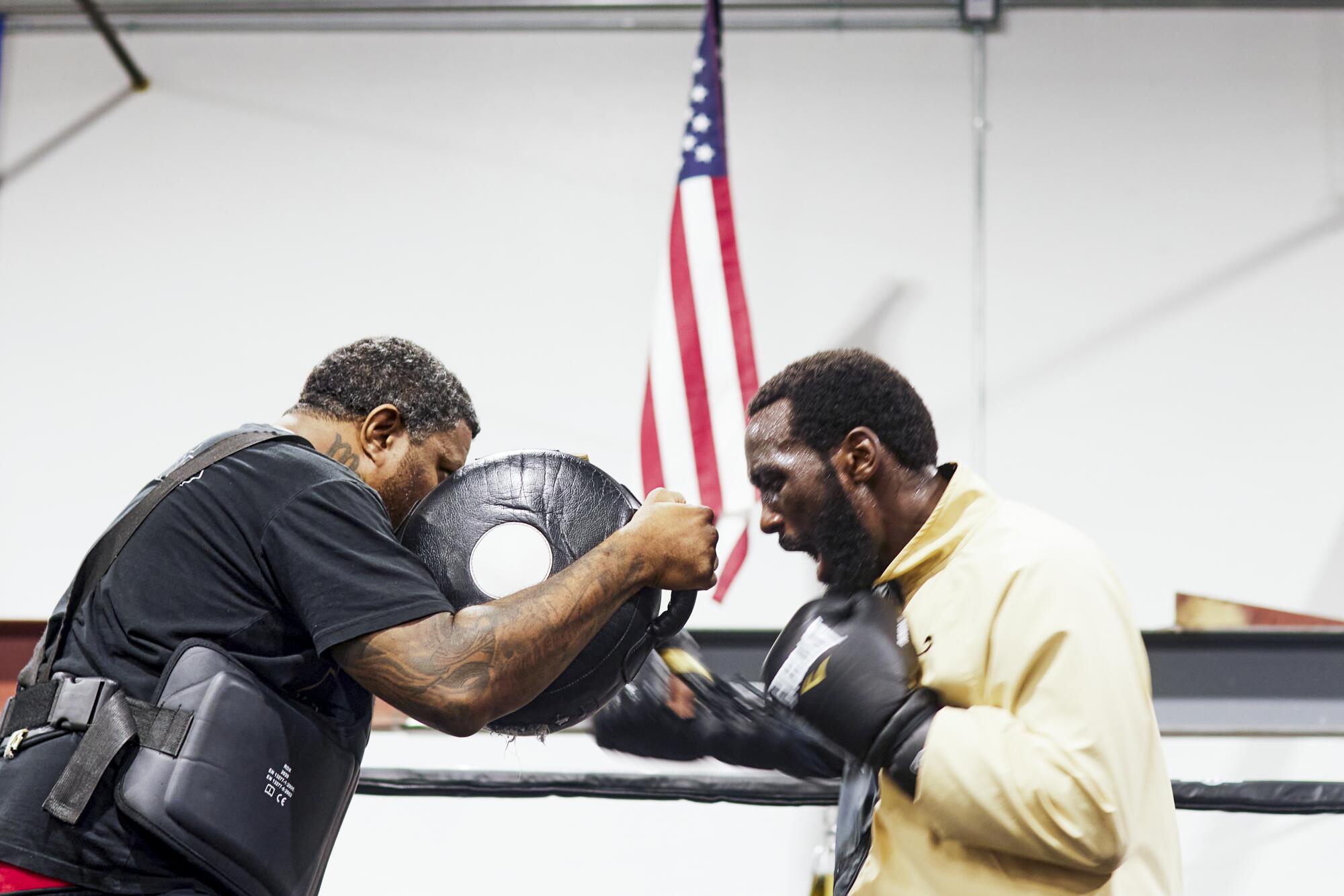
Bud strolled into the middle of the gym with his father and coaches. I could see the ease radiating off of him, talkin’ junk to whoever would listen and belly laughing as soon as he came in, glistening in another black hoodie carrying his name in gold cursive on the back. Look at him, wrestling with cadets and playing cornhole with coaches. He looked so light, he could almost float. The peace he carried inside, that aura felt immovable.
He wasn’t hiding. He merely wanted to be another body working away at the gym, a number and a nobody, just as when he was a boy looking for an outlet for his anger before he was scooped from the streets of north Omaha and thrown to the wolves in the CW Gym. The motto in Carl Washington’s place was “Don’t Talk About It, Be About It.” And in their storied history of producing top notch pugs, there has been no better representation of that than lil’ T.
When Bernie finally flipped the cadets off Bud, he stripped down on the side of the ring. He was practically bursting out of a white T-shirt, the sweat illustrating his cut up physique. Once he was fitted, he wrapped his hands by himself, alone in the corner of a ring in the middle of the gym. The way he worked, you would think he was an upstart, not 39-0 and arguably the best fighter the world has seen under 150 pounds since Mayweather.
Once Bud stepped in the ring, his face went cold and his cheekbones stiffened. He loosened his body, shaking out his hips and moving about the ring on his toes. The way he shadowboxed, my God, it was rougher than how some men swing professionally: heavy hooks moving backward, tough straights and jabs working fluidly together in combination. Bud wasn’t physically imposing, not all sinew and shoulders — but he was meticulously built. From his toes to his head, he was a fighter, not just a top heavy puncher whose strength wouldn’t register in different arenas. His jabs were like whips; no one could stun or stop, but get popped — like a towel — with it all night and you’d be bloody from the inside out. There was no stop to Bud, or his work rate. Every few minutes, as if on command, it felt like the entire gym quieted in between their heaves just to watch a master at work.
As round after round rolled over, Bud poked his bottom lip out further. He blankly shook his head. He was displeased. More. He wanted more of it. His hooks started to shake the ring. His uppercuts slashed the air with erratic gusts of wind. The flurries felt unending, like he could be here all night without sleep if he had to. When the last bell finally sounded, Bud flexed his arms into the shape of a rifle.
“BOW! BOW!! BOW!!! BOWWW!!!!”” he roared.
The bell chirped as Bud ducked underneath the black ropes of the middle ring. The champ was due for sparring. Ten rounds, two guys shuffling in every three. First was David Smith Jr., a lanky pro who’s been around a bit. As the round began, all Bud did was stare at David from across the ring, as if he were stalking his dinner.
Bud snaked his way inside, feinting in the middle distance and eating some shots on the way in — but nothing that rattled him. Most popped off his mitts or were parried. He was only waking up. Processing. Shaking the dust off the supercomputer in his brain. Bud licked his lips and kept walking forward. His opening punches were stiff, basically bats to David’s midsection.
“Box your way into it,” BoMac said. Bud got to circling, working out of the shell and dodging each hefty attempt from David’s while piecing him up inside.
During the next round, he was spinning David around with his footwork, working feints into elaborate movement patterns to leave David confused. When a counter right came over the top and bashed David backward, BoMac cheered. “S—!,” he screeched. The pace kept increasing by the round. David was starting to swing for the stars. “Pay attention!” Bud warned him, before popping him again, punitively. “Oh my God,” one parent of a teenage boxer could be heard saying, after the next hit. After three rounds,David couldn’t catch his breath, he was slipping off the canvas.
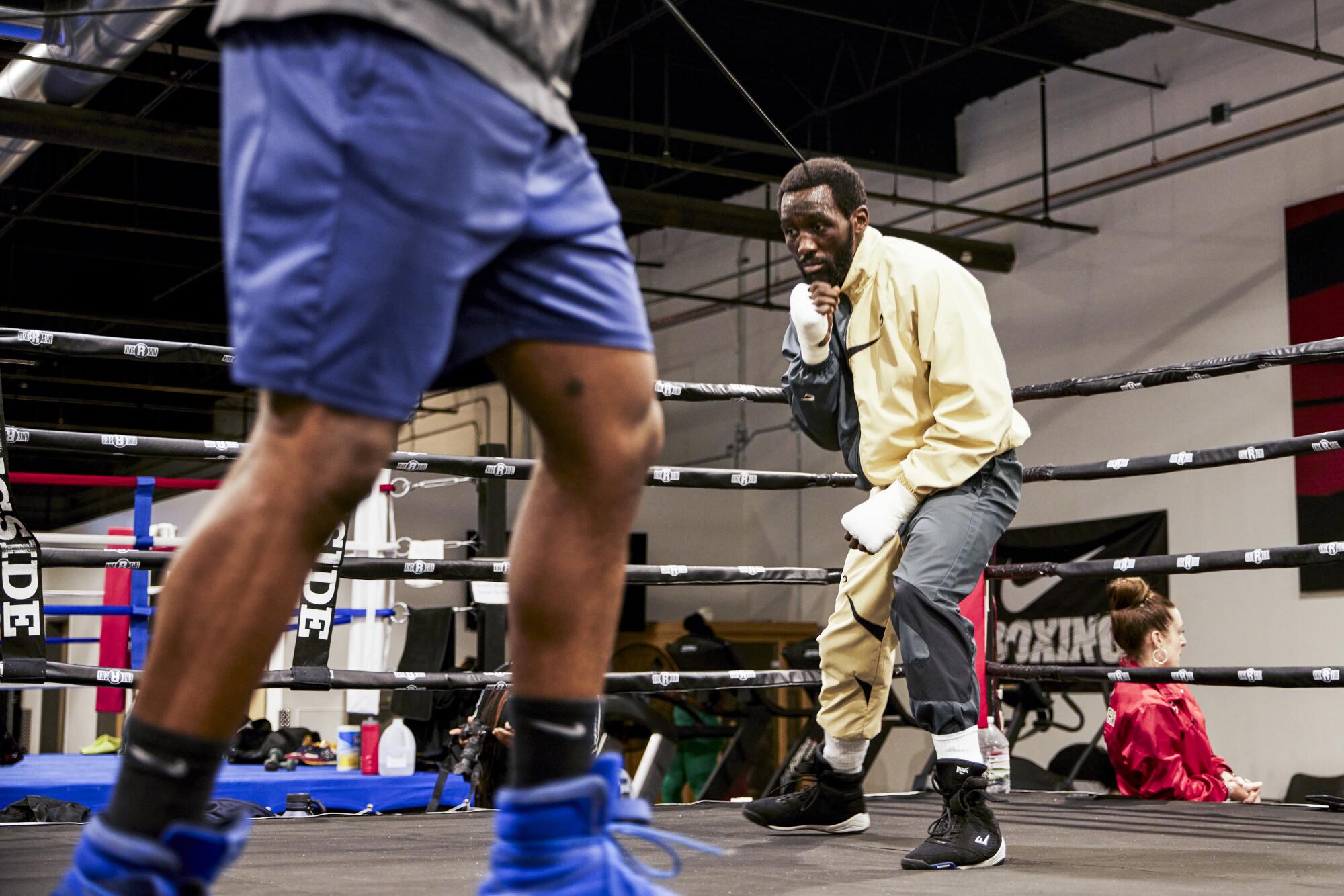
The coaches shuffled out David and brought in Willie Monroe Jr., a hulky former WBA champ at middleweight and two-time title challenger against Billy Joe Saunders and Gennadiy Golovkin. Willie was 24-3 and no slouch, even if he was 36 years old.
Noticing the weight difference between them, Bud shifted styles. His jab became sharper and electric, holding off Willie from entering his airspace in the early moments of the first round. Even facing the heavier puncher, Bud rolled off the shots and damaged Willie in the belly. Willie was melting, but wouldn’t go without putting up a fight.
He pressed Bud, forcing his way through the gashes and touched up the champ, pushing Bud back a bit. BoMac wanted to see more.
“Yeahhhh! That’s right!” he said, cupping his hand over his mouth to ensure his voice carried. “Bruise em’, bruise em’ up! Let’s see if he can handle it!” BoMac was egging on Willie. But it only lit a fire in Bud’s back.
Bud started upping the feints, forcing Willie to swing wide and hard. Bud kept his jab on a string, backing Willie into the blue corner. The punchers grew heavier by the combination. At one point, while Bud was working Willie in the second round, a few kids who were watching the brawl underneath the ropes were thrown backward. Willie could barely protect himself: jabs were coming from every direction, from the hip, splitting the guard and denting the shell. The precision of the punches were so accurate, they would’ve made quarterbacks gush. Any time Willie moved his guard or fixed his headgear or the second after he blinked, he could practically smell the leather before it touched his nose.
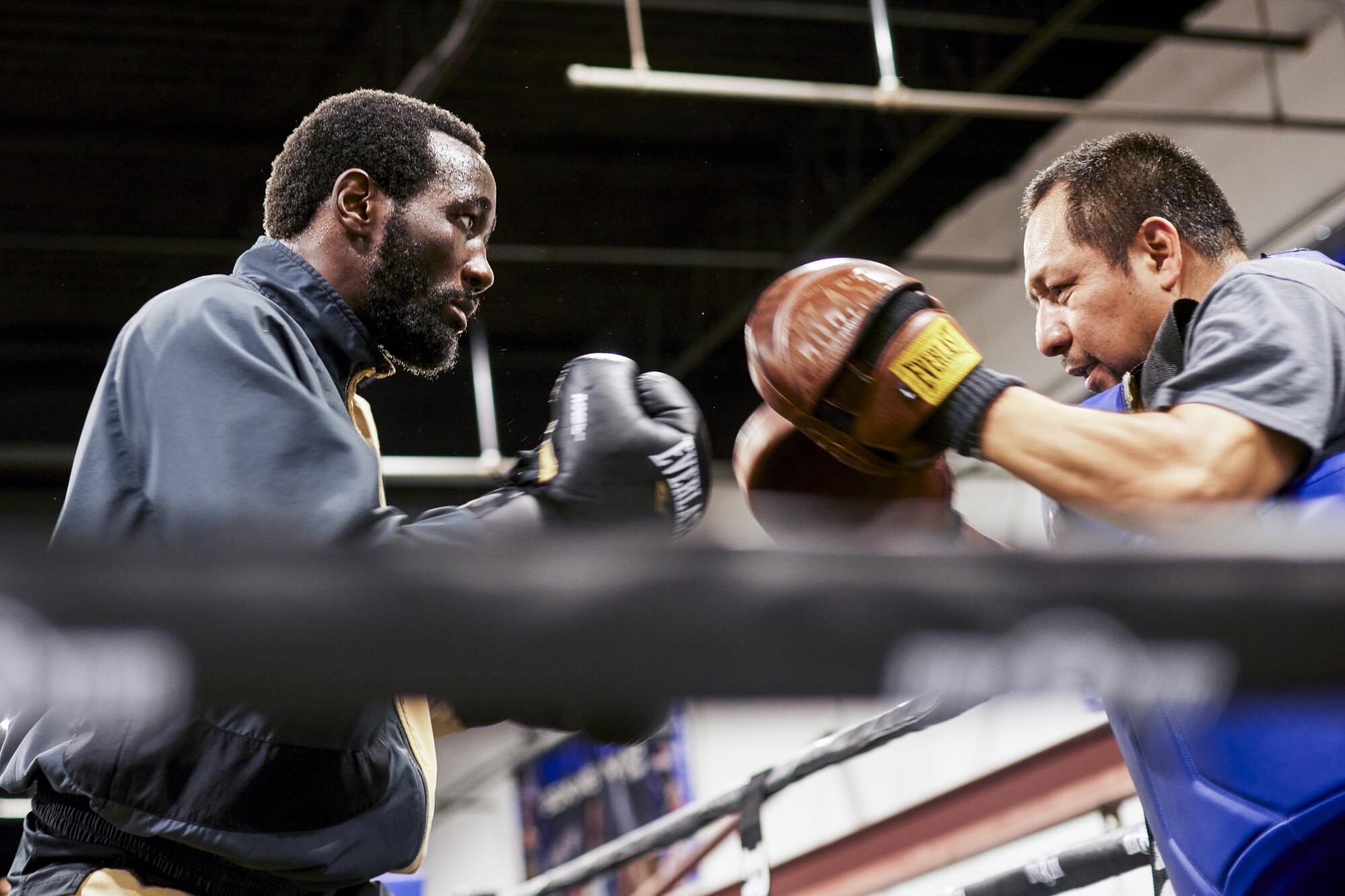
There was the duality of Bud Crawford, peaceful enough one second to bounce around the gym, deadly enough the next to bounce a bomb off your body. BoMac wanted Bud to get meaner, but at a point, it felt like overkill. “I know you don’t want to hurt ’em,” BoMac said between rounds. “But, knock em’ down like Fort Knox.” David was cowering behind his guard, Willie was getting pierced, to the point Bud just started firing at his challenger’s lead shoulder until it — and his neck — burst into a mosaic of violet hues.
“He look like a specimen, bwoi!” Bernie howled.
“It’s our time!,” he said, repeatedly, as Bud worked into another rhythm. “They won’t overlook you, champ. All of y’all,” Bernie said. “You watchin’ greatness! Y’all better learn somethin’. You gotta wanna be great, huh?! Well, round here we carve ‘em like butter; make ’em put they hands in they pockets; make ‘em wanna put they guns down, disarm ’em!
“We work this, we study this!” he crescendoed, reminding the gym of their close CW roots. “And round here: Actions speak louder than words!”
The next morning, after a strength and conditioning session run by a trainer who has worked sets for the movie “Creed,” one that coach Red Spinks described as “some torture s—” and Bud said left him aching in “mah hips, mah knees and mah ass,” coaches and crew crept back up the mountain to the camp house.
Bud, shirtless, sitting at a wooden dining table under the view of a still snow capped mountain, began devouring a helping of avocado toast and bacon with one hand — ass so sweaty from the workout that it left a mark to the laughs of his friends and training partners around the house. It’s not unusual for his camp house to be full. Bud wanted the people he came up with to enjoy the spoils that came with being a world champ. He didn’t make it out of Omaha without them, so he wouldn’t move forward without them, either.
Tuto came from Guatemala to Omaha, used to be one of Bud’s sparring partners, and when he couldn’t get fights anymore, started holding the pads. Bernie was one of the most talented boxers in Omaha, and was one of the only people back in the day Lil’ T couldn’t whip. Bernie used to beat up on Bud so bad the kid yelled from a corner in the gym, “wait ’til I get older, wait ’til I get bigger. I’m going to kick your ass!” And, BoMac? He, like anyone else here, knew firsthand about the hellfire that raised them in north Omaha.
So, the jovial nature they’ve built here was intentional. Bud had been to hell and back, from the bottom of Omaha to the top of the world, all while maintaining the slow-talkin’, good-natured mannerisms that could’ve been lost to the cruelties of his comeuppance.
“Sports took me all over the world, places that I would’ve never thought I would’ve been if it wasn’t for boxing,” he told me, picking at his food. He loved competing, at anything. Football, basketball; Hell, even playin’ cards if he could. Wrestling was even in his blood. His father, Big T, was a local legend in the grappling game, even up to the point where it took him to the Navy and across the country, leaving Bud at home, alone, with his mother, Debra, and two older sisters. “My dad, he was the one that would always push me to wrestle,” Bud said. “But, I never really enjoyed wrestling. I always wanted to fight. So, I’d get mad when somebody would hold me down,” sometimes to the point where “I’d wanna throw blows.”
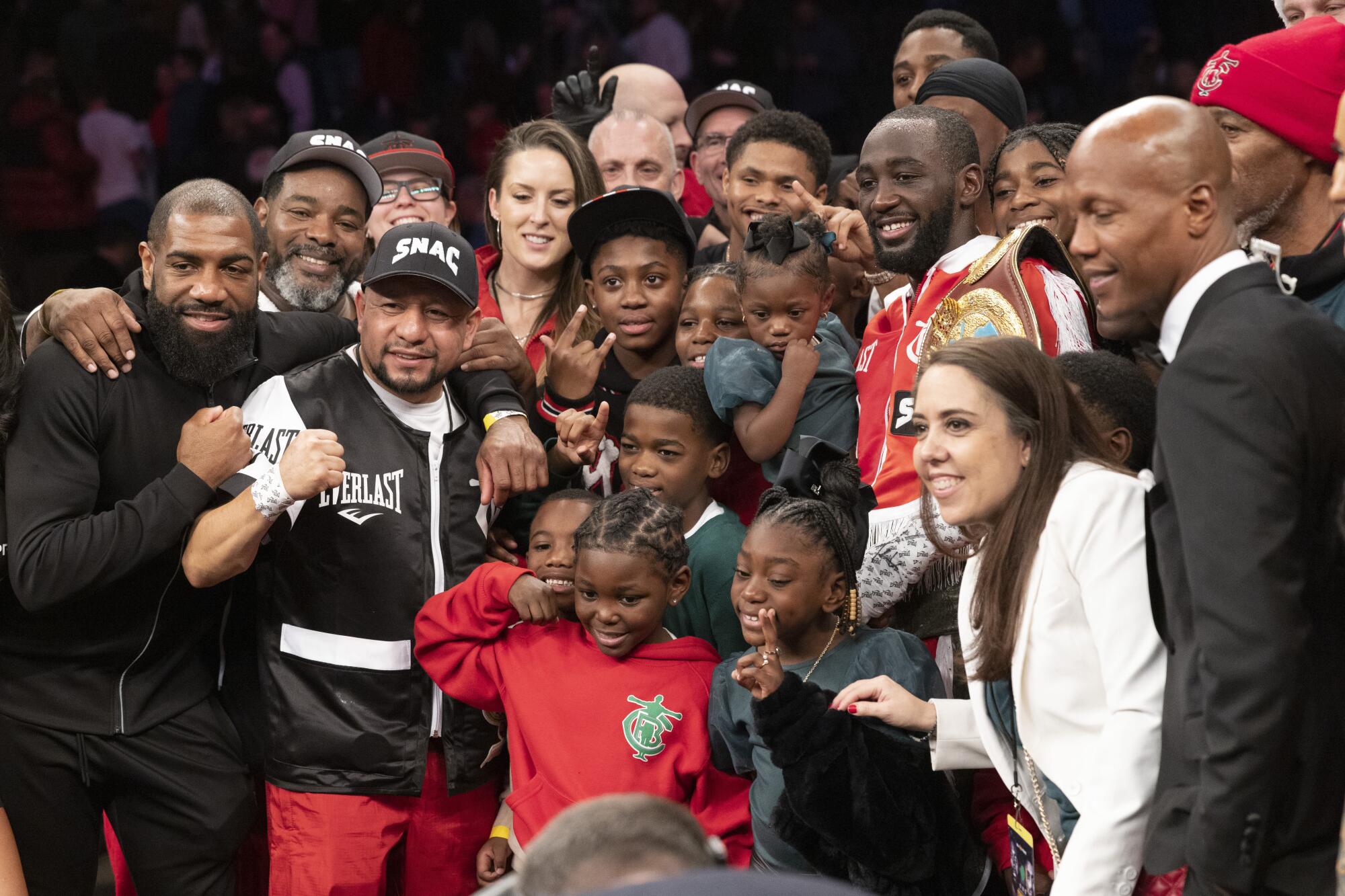
But, boxing was what the Crawfords really did. Bud’s uncle, Mike, was a terror at the CW, enough to keep BoMac on his toes with a rough style no one had seen in the gym decades. Winning was his drug, the insatiable itch that kept him up at night. Though, no matter what else he did, boxing was his true love. Nothing else was ever blessed with as much attention. He loved fighting so much, it left the gym with him. He laughed attempting to count how many scraps he was in as a child.
“We used to fight every day, every other day in the alleys,” Bud said. “Me and my friends. We’d get into fights one day and be cool the next day. Kids on the next street, we’d fight them. Kids walking down the street, we’ll fight them. I was always fighting. I had an anger problem, so that was my way of solving certain issues. Because — it’s crazy — when I was a bad, lil’ troubled kid, and you growing up and got a strong, tough parent, that’s no nonsense, you get a whoopin’ for everything you do … So as I grew up, I took on that trait of: you say something I don’t like? I’ma punch you in yo’ s—. You do somethin’ I don’t like, I’ma punch you in yo’ s—. I had that stigma of my mom whoopin’ my ass all the time, so that’s what I felt like was the thing to do.”
Debra Crawford was a tough, outspoken woman charged with the task of raising a roughneck and two older girls. The block Bud grew up on had six homes housing parts of their family, a village that looked out for him on every edge. To toughen him up, she paid kids in the neighborhood anywhere from $5-$10 to beat Bud’s ass.
As Bud liked to say, “she’s mean and nice at the same time.” Miss Debra used to say Bud was meant for boxing, that he came out of the womb with his fists balled up ready for a fight. Big T echoed that, claiming the boy born on Larrimore Street would be a million-dollar baby. But raising a Black boy in a city looking to devour him at every turn was a complicated feat. Something that could break anyone handling it alone.
There were always arguments in the house, but no bickering Bud said he couldn’t handle. BoMac always tried to steer Bud whenever it got rough, usually with some extra hours in the place he loved. “My thing was always trying to solve it with the gym,” he recalled. “But, I know one thing: they love each other. He’ll die and go to hell for her, dude. And she’ll do the same for him. That’s her baby.”
As the only boy and baby of the house, he got away with nothing; constantly getting kicked out of school, labeled the troubled kid of a house of four. Big T was away at sea, sometimes for eight months at a time, sometimes for more than a year — gone right after Bud had his first birthday.
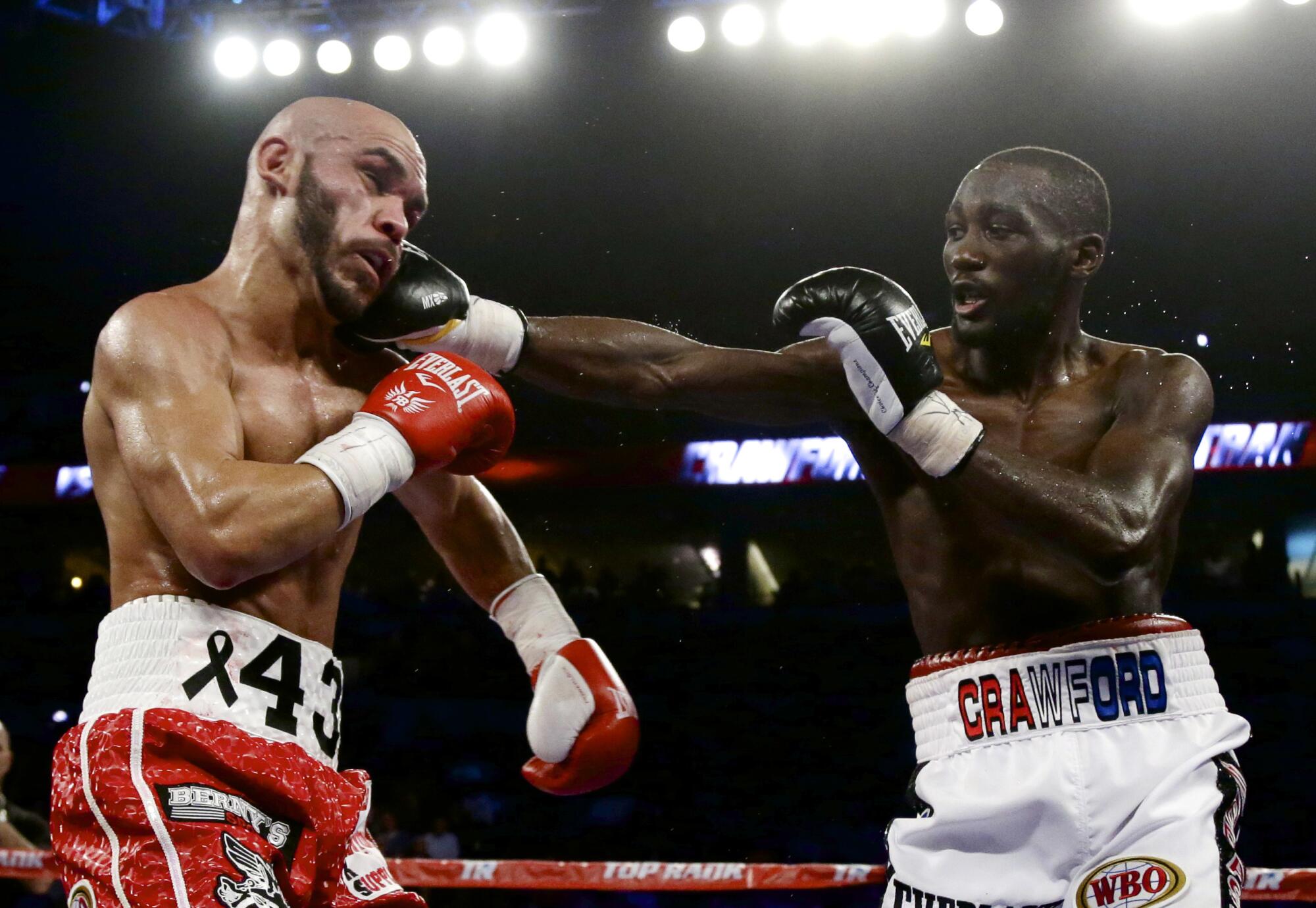
“That was hard on me,” Bud said. “I wouldn’t see him and my dad was my guide.” His father and mother separated for a time, and Big T stayed in Virginia, leaving Bud’s more violent tendencies to take over. Bud recalled starting in the CW when he was 7, one of the “lil’ tough kids in the gym, sparring all the top guys.” He says there was no easing in period – “they threw me out there to the wolves.”
One day, after a year in the gym, the coaches wanted to test his mettle. They threw him in the ring against an active fighter, much taller and stronger than Bud who quickly humbled the boy. Bud was heartbroken, but felt like he found his future. He just had to take a detour, first.
“I got kicked out of the gym for being bad,” he said. “I wasn’t listening, I was talkin’ crazy to coaches and Coach Midge [Minor] kicked me out.” After a year off playing basketball and football, he was let back into the gym. He started working the speed bag, only to be kicked out again for jumping the gun before he was ready. It also didn’t help that he started cussin’ at a coach, too. “Man, f— this gym,” he thought. “I just left.” It was the usual CW temper tantrum. “I didn’t even take it that serious,” Bernie told me. “Everybody was gettin’ kicked out,” he laughed.
But, for a while he didn’t see Bud. At that age, he took the rejection seriously. Boxing was the only true outlet he sought. During the Nebraska winters, Bud would leave Debra worried early in the mornings as he ran through the snow, desperate to work out because he thought the yearly storms would make him lazy. Without the CW, all that desire was left aimless. The community wouldn’t give up on baby Bud. The boxers thought his fighting spirit was infectious, wailing on people from the corner until he ran out of energy, showing as often as he could that no one in the city fought with more heart.
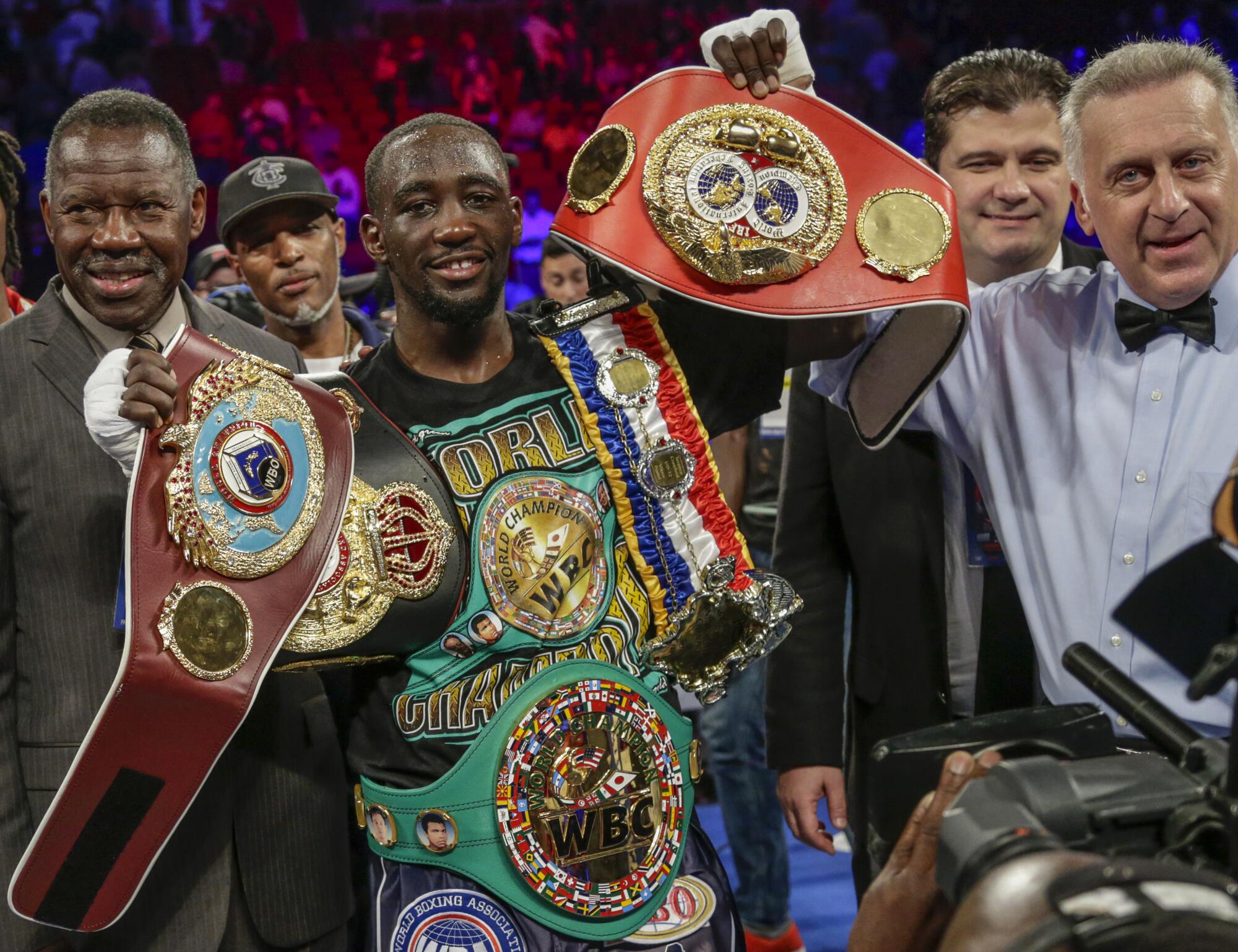
Some fighters and coaches rallied together and made fliers with Bud’s face on it, passing them out around north Omaha, trying to entice him to get back in the ring. But, Bud was stubborn, telling anyone who’d listen that he was done with boxing. There was only one thing that could get him back in Carl Washington’s van and down to the CW – a challenge.
“We got this tough lil’ Mexican down here,” Bernie told him on the corner that day. “We think he might whoop you.”
Bud, whipped his head around to the car Bernie was talking to and jumped off his bike at the perceived disrespect.
“What?!” Bud said. “I’ll come down there!”
On “family night” at the CW, when parents supported a few dreams with donations and attendance for a few fights, Bud busted through the doors with shoddy training gear ready to fight. Bernie and the others looked like they’d seen a ghost. Thinking he’d never show, Bernie fought in his place. Bud would have to wait. He came back a few days later, started training, beat up the tough Mexican and never looked back.
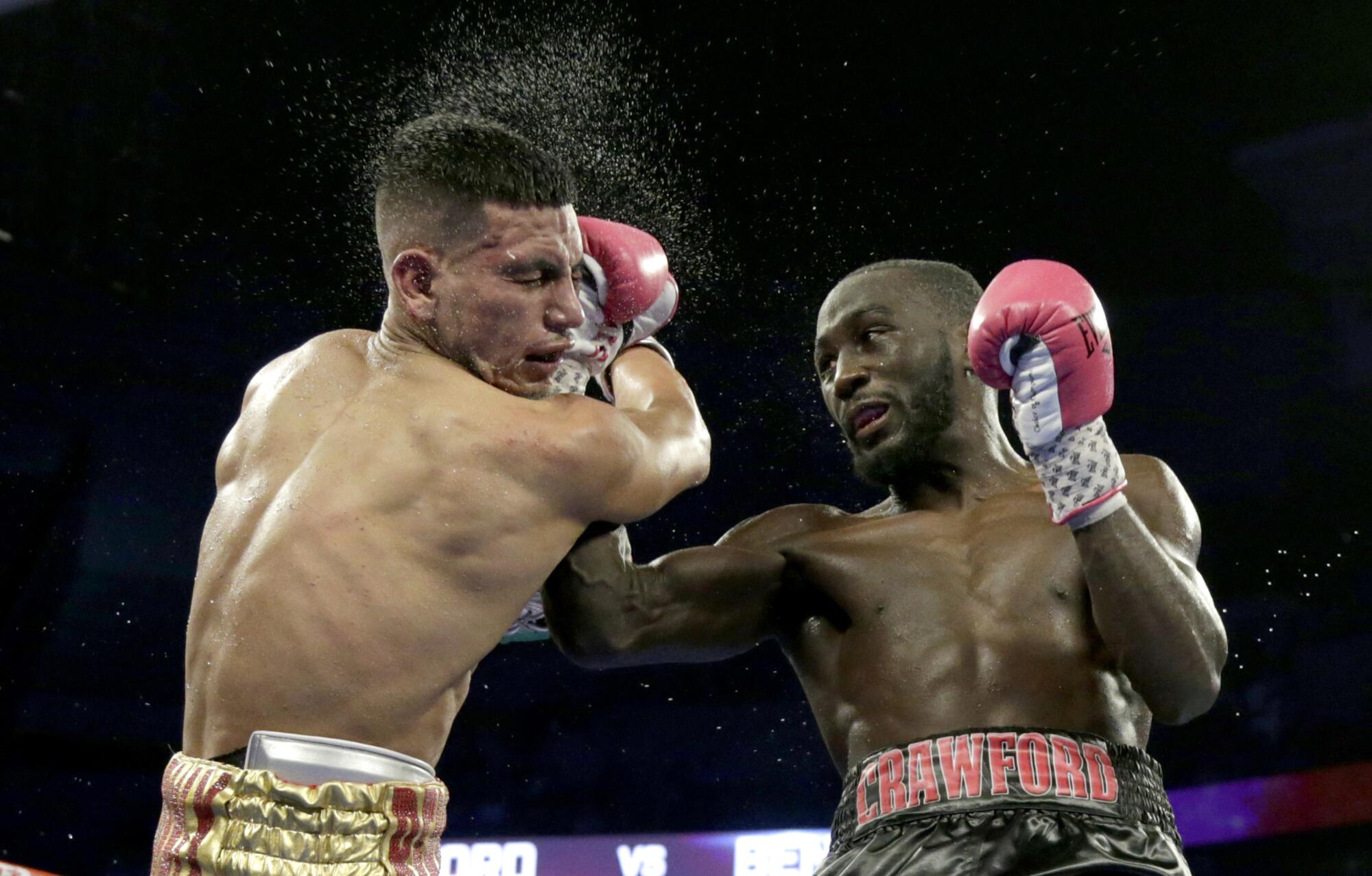
“Just win. I just have to win, at all costs,” he told me. “Whatever you gonna do in life, I just always felt like, if you gonna do something, do it to win. Don’t ever do something just to have fun. Because losin’ ain’t fun to me.” He pauses his meal and stares directly at me without blinking. There was nothing in him that looked like he wasn’t every ounce of serious.
Whenever Bud wasn’t getting kicked out of elementary school as a kid, he used to get punished because he’d always cut to the head of the line, refusing to be behind anyone else. He demanded the world understand that he was a leader. “Being in back,” he said, made him “a follower, a loser.”
“If we gonna play the game, if I’ma challenge you and you gonna challenge me? If we gonna play the game? I’ma play it to win,” Bud said about his competitive drive. “Anything I do? I’ma play it to win. I’m not gone play it just because, like ‘Oh, that was fun, but I’ma get my ass kicked.’ No. Whatever I do in life, I will do it to win.”
Bud still bears the scars of his north Omaha education.
September will mark 15 years since he was shot in the back of his head after an early-morning dice game, sitting in his ’86 Cutlass a few seconds too long, foolishly counting his money, he said, when he should have just driven off.
Bud was barely 21 years young, fresh off of a four-win pro fighting streak. He was slated to have his first big fight on ESPN in a few weeks. He’s always maintained to folks who’ve asked in the decade since that he should’ve been training that night, instead of shooting dice under the street lights. He could only count two twenties out of his stash before his back windows burst and the pops pierced the back of his skull, on the right side, just below his ear and above his neck.
“I was just sittin’ at home, chillin’, man, it was late,” BoMac told me. He got a call on his phone.
“Bo…” Bud said from the other line. “I got shot in the head.”
“Quit f— playin,’ dude,” BoMac shot back, enraged he’d make such a joke. “Why you f— playin, why you even f— out anyway.”
“Na, Bo,” Bud said. “Forreal.”
“Ahhhhh, s—,” BoMac said. “Goddamn! F—! I’ll be up there!”
BoMac hopped in the whip and sped to the hospital, knowing Bud must be OK if he was calling. Bud drove himself to the emergency room and sat there to be helped, pushed between victims. BoMac sat there all night with Miss Debra and Bud’s family until he was released. On the way out, he was told he was a millimeter from dying. But, Bud, never knowing when to quit, told BoMac that since he was alive that he could still fight on ESPN in a few weeks.
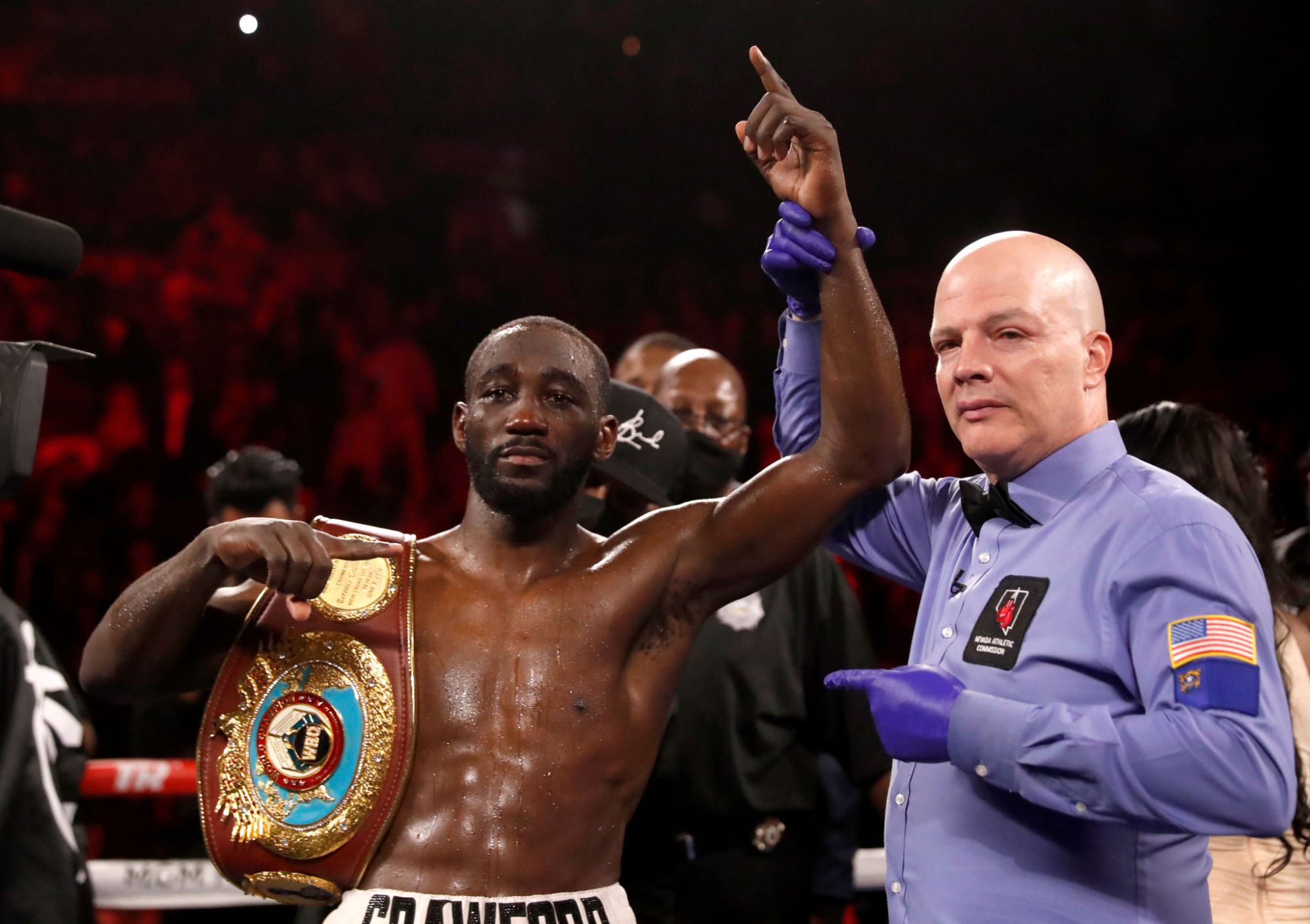
There was nothing that could stop Bud at that point. His next 35 fights were all the same, all ending with him as the victor. So, when it came to ending the years of walking by each other — the countless flexing together in pictures on the internet, to declarations about who was the badder man — Bud told me he simply called Errol and hashed out the terms. How long it took, no longer made a difference.
“Listen, like I tell everybody: me and Errol are two grown men,” he said. “Gettin’ on the phone and agreeing to terms is what we did, and that’s the end of it. That’s how this fight got done. Me and Errol Spence got on the phone and came to an agreement with each other.” He said it was as simple as each fighter, “going back to tell our peoples and get everything in writing.”
The delays in getting to this fight, Bud said, came from him being iced out, and it was out of his control. “I was being froze out, being that I was with Top Rank,” he said. “Top Rank and PBC, when it has something to do with top fighters, they weren’t just going to let me walk over there and walk away with the titles. They wasn’t gonna match me up with Danny Garcia or [Yordenis] Ugás or Shawn Porter when they had titles. They weren’t gonna match me up with Errol Spence when he had one belt.”
It was a matter of the same business that kept boxing unappealing for the last few years, losing eyes to the shameless promotion of influencer clashes instead of the pugilism that launched men from poverty into powerhouses. Critics of Bud’s resume, flawless and peerless as it might be, usually point back to his lack of high-level competition. The boxer’s argument is one that many have made: blame the people putting on the fights.
“That’s pretty much all it was with me and Errol Spence,” Bud said. “I wanted to fight, and he wanted to fight. But, business-wise, it was best that he fight the guys over there and make the most of what he could make over there without fighting me. I was just one fighter. He fought all those guys prior to me that led him to get more recognition, led him to become the A-side, led him to become a unified division welterweight champion and had me over here with one belt searching for a mega fight.”
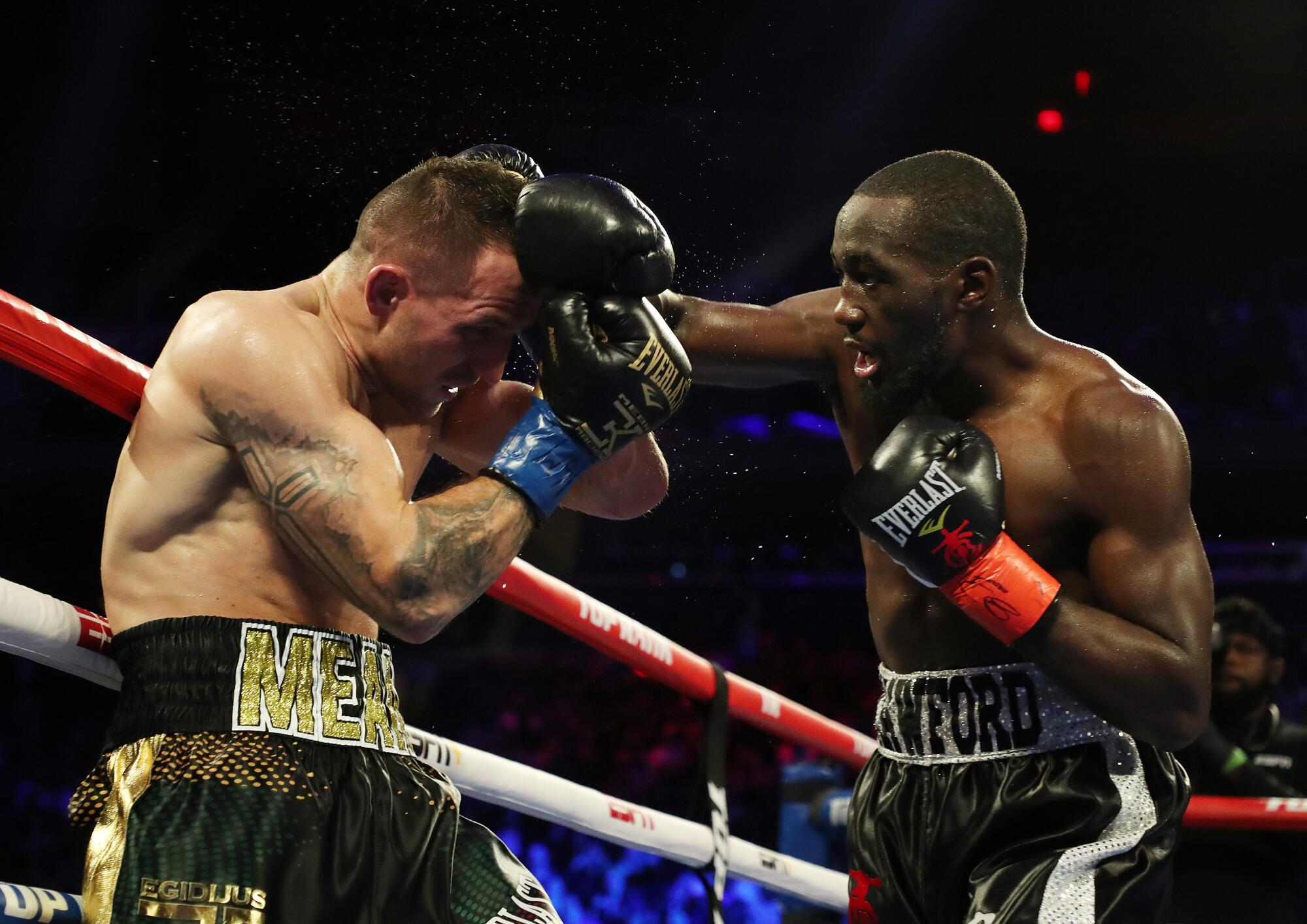
Smart business for the sport normally makes for boring boxing. Inflammatory publicity stunts and circus acts to entice organizations to match up fighters was a route Bud said he was never willing to go.
All he could do was keep fighting and keep winning. Keep reminding people he was the best in the world. He wouldn’t stoop to childish theatrics to get what he wanted. Miss Debra didn’t raise a fool.
“They wanted to make me out to be something that I’m not,” Bud said. “To take me out of my element, to talk crazy and put on this fake persona. I look at it as selling your soul just to make money. No,” he shook his head. “I’m me. I am who I am. I don’t feel like me nor Errol have to go out there and push each other off the stage or disrespect each other to sell a fight. … I’m not the person who always felt like he had to go out there and be a clown. They want Black fighters to be clowns, but when you look at all these other races and fighters … they get so much respect and attention.
“... There’s so many fighters who came through boxing that were just them, and nobody tried to make them be nothing other than who they was,” he continued. “But, when it comes to Black fighters, I felt as if you not talkin’ s—, makin’ these people want to pay to see you lose, then you’re not marketable. You can’t reach superstar status. You can be entertaining in the ring, but they don’t care about that.”
Other main draws in boxing, like Bud’s homie, Shakur Stevenson, have noticed Bud’s annoyance with boxing’s idiosyncrasies. It’s difficult for them, too, seeing the top talent in their sport overlooked.
It’s taken 40 fights for Bud’s star to come to Vegas, the mecca for the sport. If he was one of the best they had to offer, how could it take this long for a top billing?
“He’s one of the realest individuals I probably done ever came across. He ain’t doin’ nothin’ for the media. Everything is authentic,” Shakur told me. … I’m glad this fight is happening, because they finally gonna respect how great he is. … People are sleeping on Bud. They don’t understand what’s in front of them. It’s gonna be a rude awakening.”
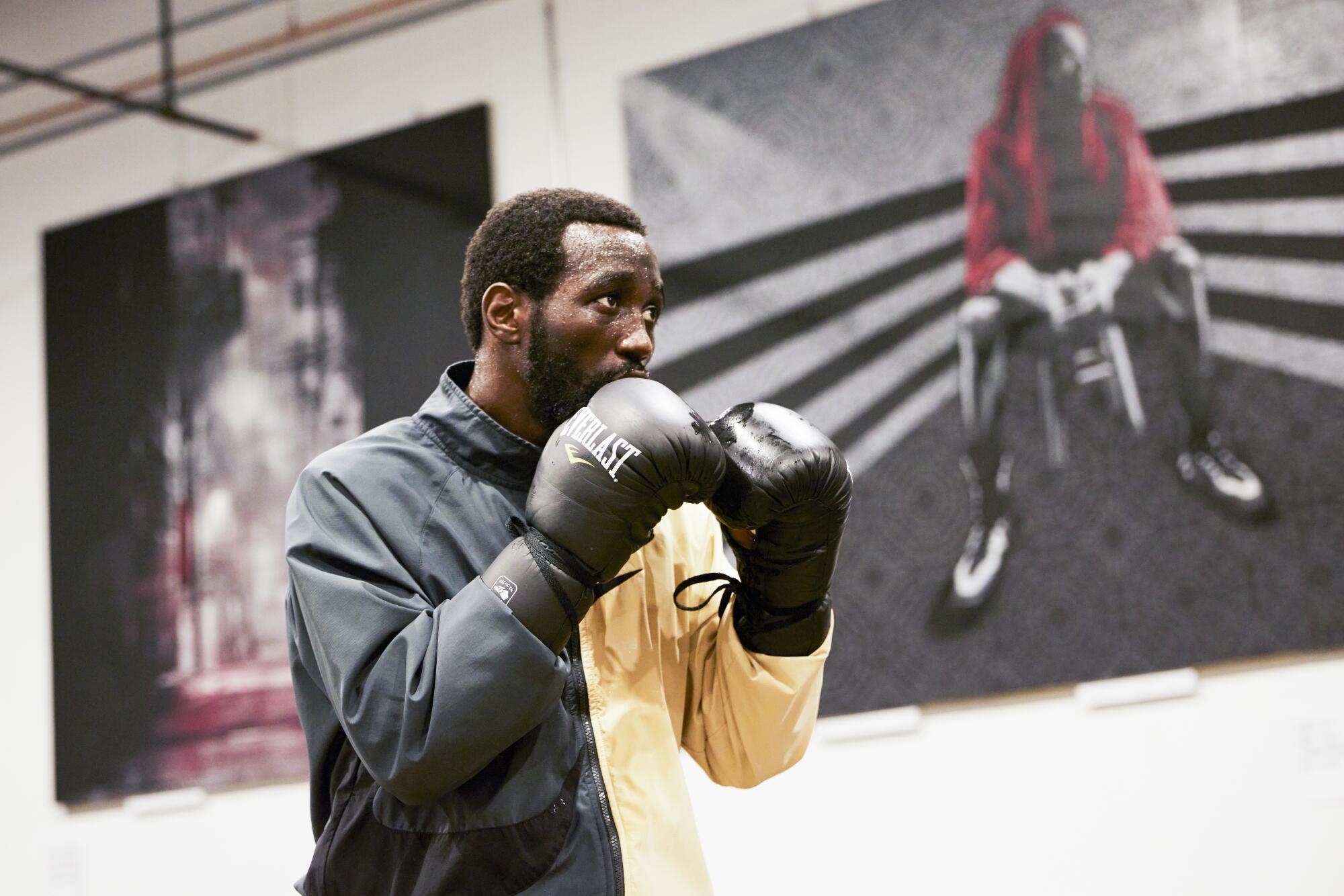
Being frozen out for almost five years left Bud and his camp frustrated, and only allowed their resentment of boxing’s politics to grow. It was either optimism or anger, and Bud had long decided to leave the pangs of fury behind him. So, talks were always on. With Errol, with Manny Pacquiao, something to land Bud the superfight he deserved.
BoMac always thought a fight with Errol was coming, so much so that he misspoke at times in public forums when he thought it was on the way. Bud stayed ready for so many years, he thought maybe his chance would never come.
“It was a lot of broken promises,” BoMac said. “It was a slap in the face.” When the fight was even in the works, BoMac would cross his fingers while rattling off whatever explanation came to his head. “I’m happy it got done,” he admitted. “But,” he said. “I’m happier for him. I swear to God, man. He’s been talkin’ about this fight for years, about what he’s gonna accomplish, and what he’s gonna do. And how he’s gonna f— this dude up.”
His frustrations boiled over into social settings. There would be moments when he and BoMac were watching other fighters in the gym, Bud would zone out for a second and, then, randomly blurt to BoMac that he was gonna kick Spence’s Errol’s ass — or fighter and coach would watch television in the camp house together, Bud would go dead silent and whisper, randomly to BoMac, “Bo…I’m gonna f— this guy up.”
“People don’t know how long that’s been manifesting inside him, inside the gym and inside the team. Now we’re at this point, and there will be no stones unturned,” BoMac said. The disrespect they’ve felt for years, like they’re the B-side in this fight, BoMac believed would turn Bud into something boxing hasn’t seen yet. “Keep treating us like we the m— B-side,” he said. “Keep throwin’ dirt in our face. Like, f– y’all, we just here to fill a spot. Nah, m—, you just here to fill that spot. The reality is that the real boxing world knows who the best m— fighter is.”
As Bud was finishing his bacon, perched into his carved out corner on the mountain, I asked him, weeks before he’d walk into the demon’s den for a fight promoters were comparing to a Hagler-versus-Hearns-style war, if there was anything about fighting Errol that worried him.
The fighters have allegedly sparred before and had been licking their chops to settle their score between the ropes. If Bud was gonna do what many thought was the impossible — baggin’ the Big Fish from Dallas — the fight wasn’t going to be won in a grind-it-out, no holds barred, barrage over 12 rounds at T-Mobile Arena. Over the months of developing the brawl between Bud and Errol, there has been an overt suggestion that Bud was the more underwhelming fighter, that Errol’s constant pressure would eventually break the smaller man. Errol said as much in a news conference, namely, that he’d roll Bud up and smoke him. But over the time I’ve spent with Bud and his stable, he has never once exuded the air of an unconfident man. Actually, it seemed more that he was a champion in wait — a fighter plagued with the task of proving, once again, that he is the pinnacle of a sport where only being about it could be a better plan of action than talking about it.
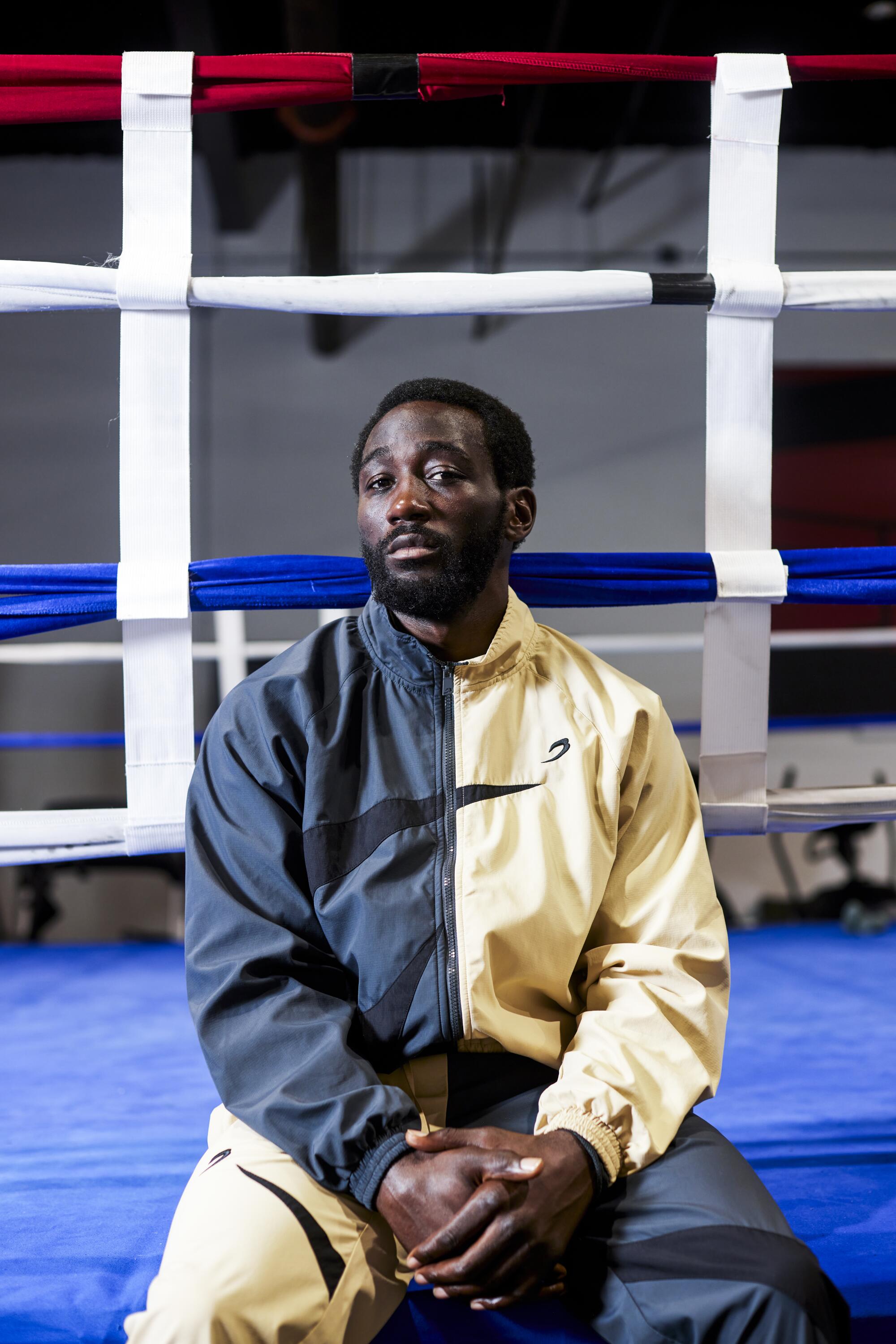
Was there anything that worried Bud about Errol? He didn’t consider my question for more than a second.
“I don’t worry ’bout nothin’ when it comes to fighting. Because I done been in the ring wit’ it all, I done seen it all. I done experienced it all. So, I know how to make the proper adjustments. If something is rough or going against what I want it to, I just make it to where I’m comfortable. I know what to do in the ring. I know how to capitalize on things. I know how to take things away. Me having that experience in the ring …”
He sighed.
He cut the modesty, and stopped pretending.
“To be honest,” he said, kissing his teeth. “I don’t even think about that.”
The thought almost rubbed him the wrong way. In his whole life, Bud Crawford never met a man who could whip him. What should change now?
“’Cause you can be the A-side, B-side, C-side, but once that bell rings?” Bud brashly asserted.
“That s— don’t mean nothin.’”
More to Read
Go beyond the scoreboard
Get the latest on L.A.'s teams in the daily Sports Report newsletter.
You may occasionally receive promotional content from the Los Angeles Times.
